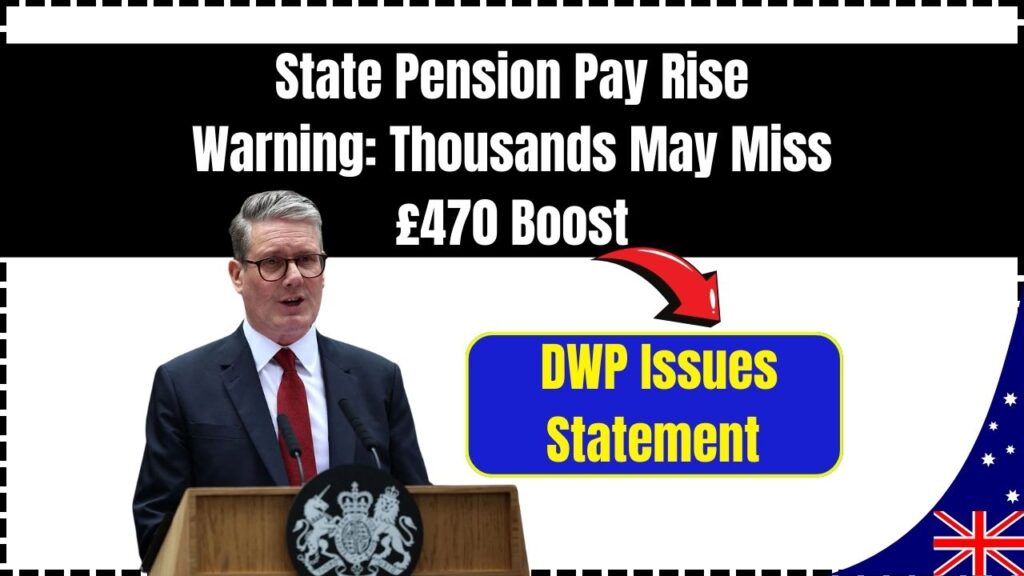
State Pension Pay Rise Warning: As of April 6, 2025, the UK State Pension is set to increase by 4.1%, providing retirees with a much-needed financial boost. However, the Department for Work and Pensions (DWP) has issued a cautionary statement: not all pensioners will receive the full increase, and thousands may miss out on up to £470 annually. Understanding the nuances of this pay rise and ensuring you’re eligible is crucial.
State Pension Pay Rise Warning
While the 4.1% State Pension increase provides welcomed relief, it comes with caveats. Thousands risk missing out on up to £470 annually due to incomplete National Insurance records or missed voluntary contribution opportunities. With a fast-approaching deadline and rising tax implications, it’s crucial to review your pension forecast, fill contribution gaps, and seek expert advice. Understanding your entitlements now means you can enjoy peace of mind in retirement later. Don’t let this valuable increase slip through your fingers — act now to secure your full benefit.
| Aspect | Details |
|---|---|
| Increase Percentage | 4.1% |
| New Full State Pension Rate | £230.25 per week (£11,973 annually) |
| Old Basic State Pension Rate | £176.45 per week (£9,176 annually) |
| Eligibility Requirement | 35 qualifying years of National Insurance contributions for full new State Pension |
| Deadline for Voluntary Contributions | April 5, 2025 |
| Official DWP Guidance | DWP State Pension Increase 2025 |
Understanding the State Pension Pay Rise Warning
The State Pension increases annually based on the government’s ‘triple lock’ system, which ensures that pensions rise by the highest of the following:
- Average earnings growth
- Consumer Prices Index (CPI) inflation
- A minimum of 2.5%
For the 2025/26 financial year, the increase is driven by the 4.1% average earnings growth recorded between May and July 2024. This ensures pensioners’ incomes keep pace with economic changes.
New State Pension Pay Rise Warning Effective April 2025
- New State Pension: Increasing from £221.20 to £230.25 per week (approx. £11,973 annually)
- Basic State Pension: Rising from £169.50 to £176.45 per week (approx. £9,176 annually)
This change represents a £471 and £361 annual boost for recipients of the new and basic State Pension, respectively.
Who May Miss Out?
Despite this increase, thousands may miss out on the full benefit due to:
- Incomplete National Insurance (NI) records
- Lack of awareness of voluntary contributions
- Confusion about eligibility for credits and back payments
To receive the full new State Pension, individuals need 35 qualifying years of NI contributions. Those with fewer years receive a proportionately smaller amount.
How to Check Your NI Record?
- Visit GOV.UK’s NI Checker
- Use the State Pension Forecast tool
- Contact HMRC or the Pension Service: If you see missing years or errors
Filling Gaps in Contributions
- Voluntary Contributions: Pay Class 3 NI contributions (£17.45/week for 2024/25)
- Claim NI Credits: If you were a carer, unemployed, or on benefits, you may be eligible
- Deadline: You have until April 5, 2025 to fill gaps dating back to 2006
This is a one-time extension — after 2025, you’ll only be able to backdate six years.
Tax Implications to Consider
As the State Pension approaches the personal income tax threshold (£12,570), more pensioners may be taxed, particularly if they have:
- A private pension
- Earnings from part-time work
- Savings interest
Tax allowances are currently frozen until 2028, which may increase the number of pensioners paying income tax over time.
Means-Tested Benefits at Risk
Higher State Pension payments may reduce eligibility for benefits like:
- Pension Credit
- Housing Benefit
- Council Tax Reduction
It’s important to contact your local authority or DWP to understand if and how your benefits might be affected.
Practical Steps to Secure the Full Boost
- Check NI record annually
- Consider voluntary contributions
- Use online forecasting tools
- Seek guidance from a financial adviser
- Don’t wait until the 2025 deadline
Eligibility for £549 Weekly State Pension Released by DWP – Check Payment Date
£221.20 State Pension Kicks In Soon – Who will get it? Check Eligibility & Payment Date
UK Benefits & Pensions Cut by £459 Annually – Who’s Affected and Why?
Frequently Asked Questions About State Pension Pay Rise Warning
Q: Who qualifies for the State Pension increase in April 2025?
All current State Pension recipients will receive a 4.1% increase. The amount depends on whether they are on the new or basic State Pension scheme.
Q: How do I know if I have enough qualifying years for the full State Pension?
Use the State Pension Forecast tool on GOV.UK or review your National Insurance record.
Q: Can I top up my National Insurance contributions?
Yes. You can make Class 3 voluntary contributions to fill in gaps. The deadline to fill in gaps as far back as 2006 is April 5, 2025.
Q: Will this increase push me into paying income tax?
It could. The full new State Pension will be £11,973, close to the £12,570 personal allowance. Any other income may be taxable.
Q: Does the increase affect my Pension Credit or other benefits?
Yes, in some cases. It may reduce or eliminate eligibility for certain means-tested benefits. Contact DWP for a personalised assessment.
Q: What if I am living abroad? Do I still receive the increase?
Only if you live in a country that has a reciprocal agreement with the UK on uprating pensions.







